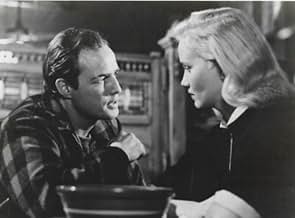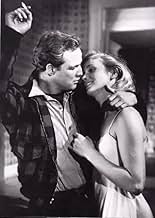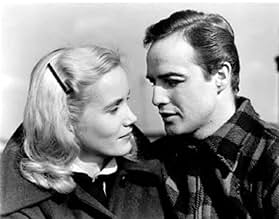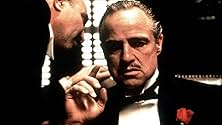La fabuleuse aventure du cinéma américain
Titre original : The Movies
ÉVALUATION IMDb
7,8/10
1,6 k
MA NOTE
Un regard sur l'histoire du cinéma et son impact sur notre culture.Un regard sur l'histoire du cinéma et son impact sur notre culture.Un regard sur l'histoire du cinéma et son impact sur notre culture.
Parcourir les épisodes
Avis en vedette
First off, the show tried to cram too much into each episode. Most the episode is having people say "this was a good movie" and then moving on to the next film. The show doesn't have that much of a direction. It becomes obvious that it is about people in Hollywood wanting to say what movies they like and nothing more.
I expected explanations and how Kurosawa and other foreign directors influenced Hollywood movies but we mostly got list of movies from that era which we already knew. Movies that were significant for black culture were the only thing that were explained well. No Kurosawa no Fellini no Goddard no Ozu no Bergman and Tarkovsky... I loved when Edgar Wright and PTA were talking but that's about it.
CNN Films have been making excellent documentaries for many years now. The first episode in the series called "The Movies" focuses on the movies of the 80s - one of the greatest decades for film and music. Nevertheless, 12 minutes into it, and I found myself resorting to my basic instinct to fast-forward it. I did finish watching it though (I had DVR'd it). However, it was nothing like sitting with my eyes wide open and jaw on the floor for the entire duration of "Apollo 11."
The format of the documentary series is straightforward. A brief interview with an actor, director, or film critic is followed by the relevant movie clip, another interview, a movie clip, and then rare behind-the-scenes footage. More interviews follow, and the cycle repeats until the credits roll. Nothing wrong with the format here but the subjects discussed was random at best.
Even 30 minutes into the 80s episode, I still found it hard to discern the intent of the filmmakers. On the one hand, they appear to be aiming for the lofty goal of examining the confluence of movies and popular culture of a decade, and on the other hand, they seemed to be hell-bent on keeping the entertainment aspect their top priority. This documentary series could have been an excellent opportunity to educate the audience on how the culture of each decade influenced the film making of that era. Had they cared to investigate from the standpoint of Media Anthropology - as a means of understanding audiences and social aspects of mass media - instead of solely relying on the entertainment value of the films, they could have achieved the real purpose behind making a documentary, which, as I mentioned earlier, should be to educate the masses. For a documentary that professes to aim high, it did not feel like an intelligent and in-depth analysis of the impact cinema of any past decade had had on society or vice versa. It is doubtful whether the series as whole succeeds in convincing its viewers that movies are more than the satisfactory crunch of overpriced popcorn under your teeth.
This documentary series is about an art form that focuses on entertainment. However, they seem to have overlooked one crucial detail. They chose to make a documentary on the behind-the-scenes and cultural impact of the movies, but then being a documentary, and it is a fair argument to make, they should have at least focused on educating the masses on why the entertainment industry functions the way it does. Constant titillation with trivia and shallow discourse doesn't exactly do justice, case in point:
In the 80s episode, one moment the guests are gushing over ET and the cultural impact its success had, the next moment the director decides to blast - very briefly, mind you - through the apocalyptic background of Robocop and Mad Max. If you blink right here, you could miss the mention of at least two more films. A few minutes pass and then: A quick peek into how Rob Reiner embarrassed himself imitating an orgasm in front of his on-set mother, and then you get pushed into the sweaty and bloody face of Robert de Niro in Raging Bull. There are tidbits of movie trivia thrown in between these scenes and some more interviews. I must admit the part of John Huges, and his movies were really touching, and I really enjoyed it.
The filmmakers tried to cram a lot in two hours of each episode, including occasional orbits around some social issues before landing squarely on the safe platform of entertainment. This is what generally happens on every episode of the series. There is nothing in any of the two-hour events that you cannot find online, in print or in the Special Features section of a DVD. The entire exercise, though entertaining, seemed futile to me. Needless to say, I for one, am left none the wiser.
The format of the documentary series is straightforward. A brief interview with an actor, director, or film critic is followed by the relevant movie clip, another interview, a movie clip, and then rare behind-the-scenes footage. More interviews follow, and the cycle repeats until the credits roll. Nothing wrong with the format here but the subjects discussed was random at best.
Even 30 minutes into the 80s episode, I still found it hard to discern the intent of the filmmakers. On the one hand, they appear to be aiming for the lofty goal of examining the confluence of movies and popular culture of a decade, and on the other hand, they seemed to be hell-bent on keeping the entertainment aspect their top priority. This documentary series could have been an excellent opportunity to educate the audience on how the culture of each decade influenced the film making of that era. Had they cared to investigate from the standpoint of Media Anthropology - as a means of understanding audiences and social aspects of mass media - instead of solely relying on the entertainment value of the films, they could have achieved the real purpose behind making a documentary, which, as I mentioned earlier, should be to educate the masses. For a documentary that professes to aim high, it did not feel like an intelligent and in-depth analysis of the impact cinema of any past decade had had on society or vice versa. It is doubtful whether the series as whole succeeds in convincing its viewers that movies are more than the satisfactory crunch of overpriced popcorn under your teeth.
This documentary series is about an art form that focuses on entertainment. However, they seem to have overlooked one crucial detail. They chose to make a documentary on the behind-the-scenes and cultural impact of the movies, but then being a documentary, and it is a fair argument to make, they should have at least focused on educating the masses on why the entertainment industry functions the way it does. Constant titillation with trivia and shallow discourse doesn't exactly do justice, case in point:
In the 80s episode, one moment the guests are gushing over ET and the cultural impact its success had, the next moment the director decides to blast - very briefly, mind you - through the apocalyptic background of Robocop and Mad Max. If you blink right here, you could miss the mention of at least two more films. A few minutes pass and then: A quick peek into how Rob Reiner embarrassed himself imitating an orgasm in front of his on-set mother, and then you get pushed into the sweaty and bloody face of Robert de Niro in Raging Bull. There are tidbits of movie trivia thrown in between these scenes and some more interviews. I must admit the part of John Huges, and his movies were really touching, and I really enjoyed it.
The filmmakers tried to cram a lot in two hours of each episode, including occasional orbits around some social issues before landing squarely on the safe platform of entertainment. This is what generally happens on every episode of the series. There is nothing in any of the two-hour events that you cannot find online, in print or in the Special Features section of a DVD. The entire exercise, though entertaining, seemed futile to me. Needless to say, I for one, am left none the wiser.
Where is european cinematography? Where are Jarmusch, Lynch? Where "Godfather"?
It starts so well, until it rushes through movies that need to be talked about, to talk about some random film never heard of. The way they skip back and fourth through years skipping 9 yrs froward then 9 years back seems to damage what that decade did in Cinema and the 2000 taken over promoting the same bad films Oscar's did. If anything shows not much hope for cinema going forward. Tried to please too many people but missed so many movies and including cartoons like Pixard shows the program has no credibility. This could and should include movies in categories, Action, comedy etc. They could then do cartoons if they must. All you see today is directors controlled by studios and political pandering and lots of angry people wishing they re-shoot the failed movies rushed in to cinemas and studios trying to remake movies without a clue as to why the movie was a hit.
Le saviez-vous
- AnecdotesThis documentary has an interview with legendary actress, Eva Marie Saint and includes footage of the last time she spoke on camera about her performances in "On The Waterfront" and "North By Northwest"
Meilleurs choix
Connectez-vous pour évaluer et surveiller les recommandations personnalisées
- How many seasons does The Movies have?Propulsé par Alexa
Détails
Contribuer à cette page
Suggérer une modification ou ajouter du contenu manquant



































